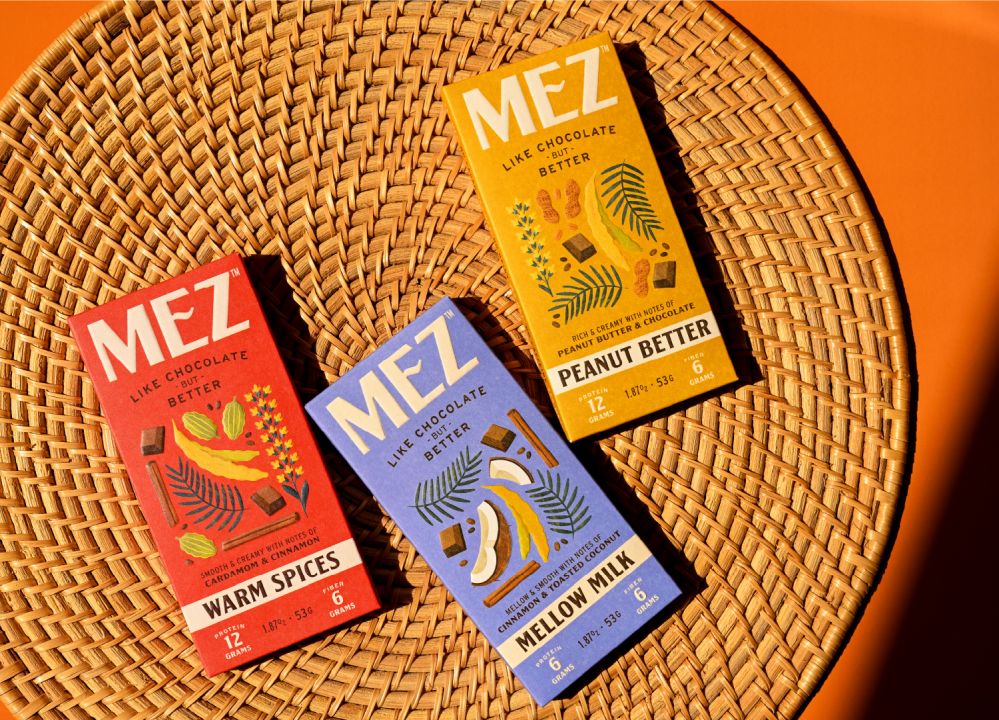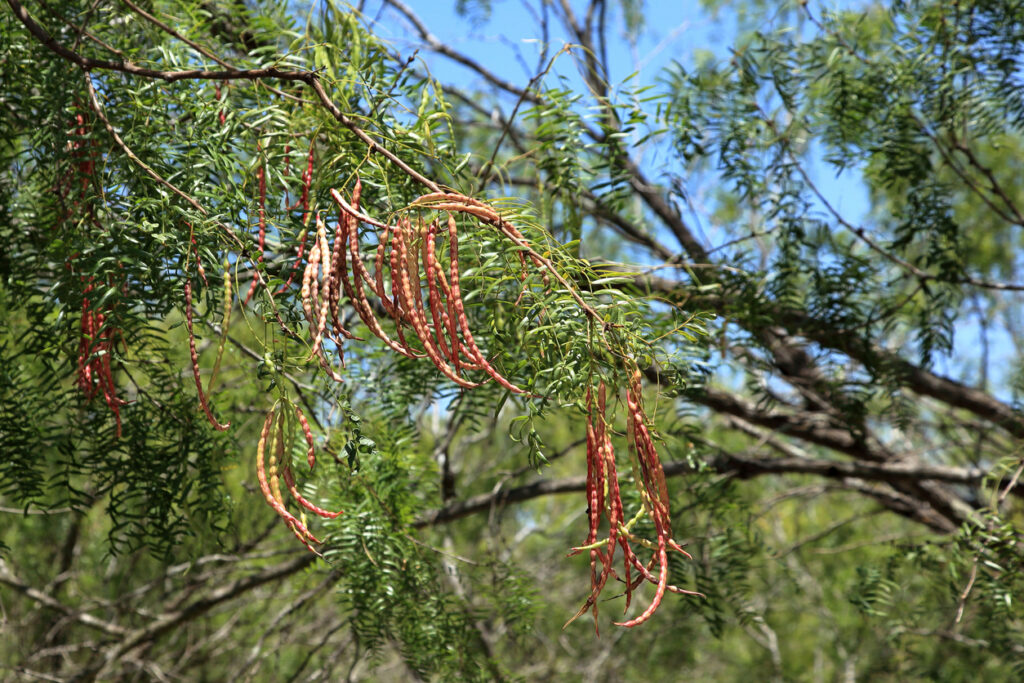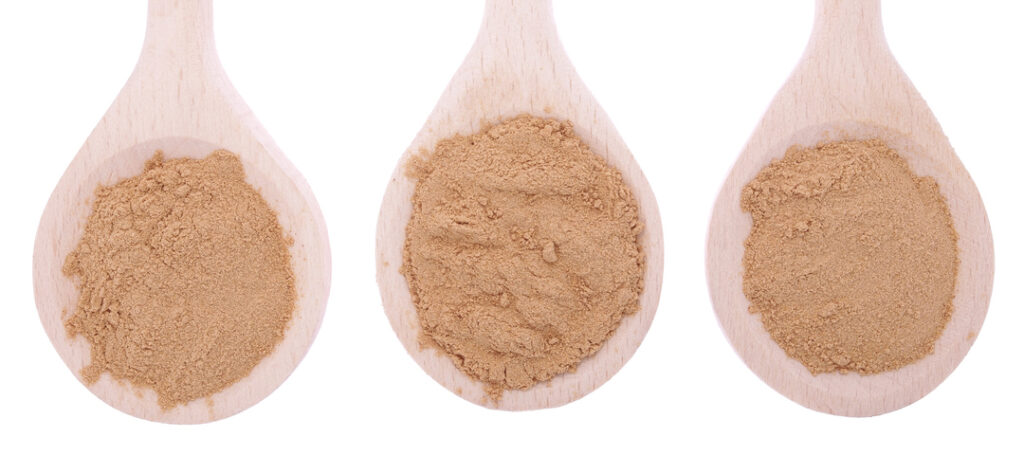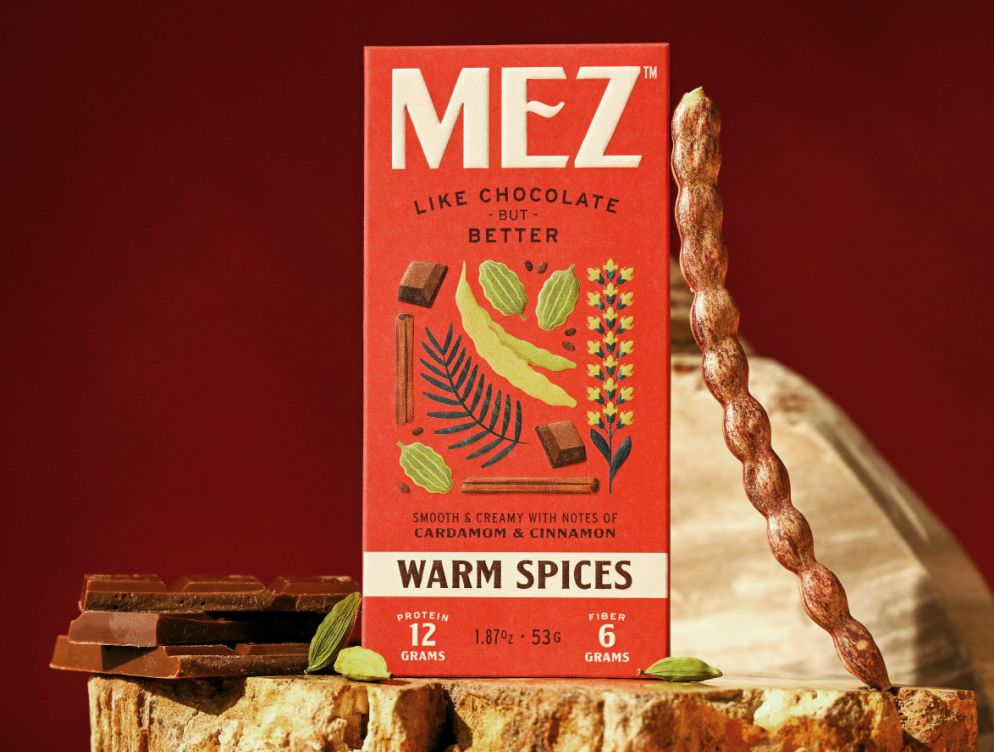Cocoa prices are currently in the stratosphere, with an imbalance between supply and demand exacerbated by everything from volatile weather to pests and disease, illegal mining and land degradation, aging trees, and investor speculation.
And that’s before you address ethical and environmental challenges variously associated with the crop, from deforestation and a high water footprint to child labor, says Mez Foods cofounders Bob and Ben Schultz, who started exploring alternatives early last year.

While some startups are using upcycled coffee grounds and grape seeds to replicate cocoa, Chicago-based Mez Foods has homed in mesquite, a leguminous tree with pods that can emulate some of cocoa’s qualities, but can also take center stage as an ingredient around which to create a brand.
Although mesquite looks similar to carob, an ingredient that’s been used in alt chocolate for decades, especially in Europe, “they are completely different species,” says Bob, a food scientist who most recently worked at alt protein startups Simulate and Aqua Cultured Foods. “Carob is part of the Ceratonia genus, while mesquite is part of the Prosopis genus, although they are both in the Fabaceae family, along with soy, peas, and other legumes.”
He adds: “The Spanish term algarrobo is carob and they initially, and mistakenly, called mesquite beans the same thing. In parts of Mexico, they call it mesquite, but in many parts of South America, they still call it algarrobo, despite it being a misnaming.”
Turning mesquite into a household name?
According to Ben: “When we first started Mez Foods early last year, we were initially of the mind that we needed to create a brand to showcase mesquite to consumers through something that would play like chocolate and occupy some of the same use cases, but over time would create its own distinct category, offering new flavors and experiences.
“And that’s still the goal of our consumer-oriented brand, to try to turn mesquite into a household name that stands on its own, not as a chocolate alternative,” says Ben, former director of product management at Peleton with a background in sales, operations and supply chain management.
But with soaring cocoa prices driving industrial chocolate players to more actively explore cocoa and chocolate alternatives, he says, being able to offer wholesale options for bakers and other chocolate buyers looking to reduce or replace their cocoa-based choc started to look like an equally attractive proposition.
“We had intended that the b2b side of our business would be our second phase, but we’re actually in the process of considering making that our primary focus, and for that to work, we need our product to taste as close to chocolate as humanly possible.”

‘The relatively undeveloped nature of the mesquite supply chain is both one of our biggest opportunities and one of our biggest risks’
A drought-tolerant tree that grows throughout Mexico and the southwestern US, South America, Africa, and Asia, mesquite has long beige-colored pods that can be ground into flour and used in baking or as a seasoning. Mez Foods combines it with illipe butter (gaining traction as a palm oil and cocoa butter replacement), chufa (tigernut) flour, fermented pea & rice protein, and a small amount of carob flour to (“to round out the flavors of the mesquite beans”) to create its ‘like chocolate but better’ bars.
According to Ben: “Mesquite can grow pretty much anywhere and there is an industry around cultivating it agriculturally and processing it for food ingredients, but right now it’s fairly localized, and what’s tending to happen is that these trees are growing wild and landowners are typically working with various organizations to essentially forage the trees.”
He adds: “We see the relatively undeveloped nature of the mesquite supply chain as both one of our biggest opportunities as a business and one of our biggest risks. So when we talk about risks, we’re still trying to determine the full extent of what the current supply chain of mesquite can meet from a capacity standpoint. The opportunity is that we see an ability to really grow this agricultural system using modern technology and trade practices.”
If you grind up the entire pod including the skin and seeds, the flour has 40%+ protein and a significant amount of fiber, says Ben. If you just grind the flesh (the kind of mesquite flour Mez Foods is currently sourcing) it’s slightly lower in protein.
“We’ve been experimenting with all different forms and suppliers from smallholder foragers in Texas all the way down to more industrial sources in South America. But it’s naturally very sweet with rich aromas of chocolate and cinnamon, but there’s also some complexity with notes of toasted coconut and date.”
According to Bob: “What’s exciting is that there are multiple different species of mesquite with different flavor profiles, so some have a honeycomb kind of flavor, for example. Plus through processing such as roasting, smoking, and fermenting there are so many possibilities that we feel like we’ve barely scratched the surface in terms of flavor development.”
Consumer vs industrial business model
On the industrial/wholesale side, you don’t need to ‘sell’ the argument for a chocolate alternative, notes Ben. Anyone buying cocoa or chocolate in bulk is actively exploring ways to reduce or replace it in some products given the recent surge in pricing.
One the consumer side, it’s a different ballgame, he says. As players in the meat alternatives space are learning fast, many consumers do not know or do not care about the problems in animal agriculture they are trying to solve. And while they say they will pay more for a more sustainable or ethical product, companies also need to offer an immediate consumer benefit.
For Mez Foods, which started selling its wares at farmers’ markets before launching a direct-to-consumer business last year, that’s both a novel ingredient and superior nutrition, with more protein and fiber, no dairy, and far less sugar than regular chocolate “which is often loaded with sugar to offset the bitterness of the cocoa” says Ben.
“We subscribe to this belief that you have to be an order of magnitude better than existing options in order to drive consumer change. And it’s pretty hard to make something more convenient or that tastes better than chocolate. So we wanted to come up with a bar that you can love and eat every day that isn’t going to spike your blood sugar and gives you 12g protein, 6g fiber and only 12g sugar without using [high intensity] sweeteners or sugar alcohols.”
On the industrial side of the business, the Schultz brothers are talking to bakeries and other businesses that currently buy chocolate to assess their interest, says Ben. “We did a small pilot with a bakery in Chicago, and some of our syrups are making their way into some local Chicago businesses. But we’re just starting conversations with larger companies to see what their appetite is for this.”


Mesquite as coffee alternative?
To date, Mez Foods is self-funded, say the brothers, who are sub-leasing a chocolate-making facility in Chicago and now exploring outside investment options. “We are just starting to talk to investors. As we look at the opportunity in the ingredients sides of the business, we actually see potential for venture capital in a way that we didn’t see when we were primarily trying to build a consumer brand.”
According to Ben: “What’s interesting is that mesquite is also a potential alternative to coffee, which is also facing significant supply chain challenges. In fact one of the larger uses for mesquite in South Africa is as a decaf coffee alternative [inspiring some US startups such as Kamana].”





